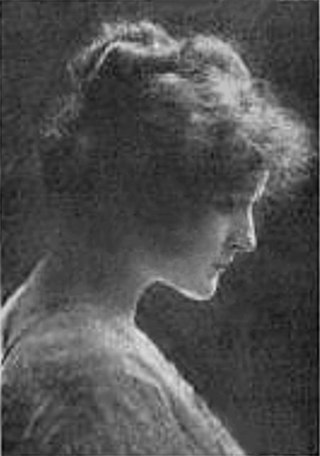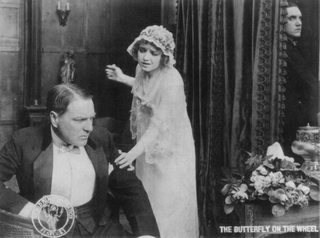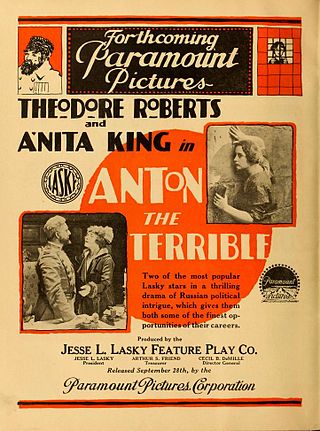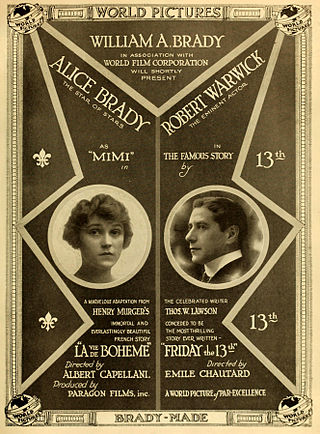Related Research Articles
Point of View or Points of View may refer to:

Viola Barry was an American silent film actress who starred in a number of films during the 1910s.

Clara Whipple(néeClara or Clarissa or Clarise Brimmer Whipple; November 7, 1887 – November 6, 1932) was an American actress who flourished in theatre from 1913 to 1915 and in silent film from 1915 to 1919. She was also a silent film scenario writer.

Émile Chautard was a French-American film director, actor, and screenwriter, most active in the silent era. He directed more than 100 films between 1910 and 1924. He also appeared in more than 60 films between 1911 and 1934.

The Flaming Forest is a 1926 American silent drama film directed by Reginald Barker and starring Antonio Moreno and Renée Adorée. The film is based on the novel of the same name by James Oliver Curwood, and was produced by Cosmopolitan Productions and distributed by Metro-Goldwyn-Mayer. A two-color Technicolor sequence was shot for a climactic blaze sequence featured in the film.

Lilac Time is a 1928 American synchronized sound romantic war film directed by George Fitzmaurice and starring Colleen Moore and Gary Cooper. While the film has no audible dialog, it was released with a synchronized musical score with sound effects using the sound-on-disc Vitaphone process. The film is about young American aviators fighting for Britain during World War I who are billeted in a field next to a farmhouse in France. The daughter who lives on the farm meets one of the new aviators who is attracted to her. As the flyers head off on a mission, the young aviator promises to return to her.

The World Film Company or World Film Corporation was an American film production and distribution company, organized in 1914 in Fort Lee, New Jersey.
Sincerely Yours is a 1955 Warner Color film romantic music comedy starring Liberace. It was Liberace's first starring motion picture and was a recreation of his concert performances and a remake of the Warner Bros. 1932 film The Man Who Played God, which was itself a remake of the 1922 film The Man Who Played God, also based on the 1914 Jules Eckert Goodman play The Silent Voice.

Jules Eckert Goodman was an American playwright and author. He was best known for his plays Treasure Island (1915), The Man Who Came Back (1916), The Silent Voice (1914), Chains (1923), and a series of plays featuring Potash and Permutter written with Montague Glass.

Montague Marsden Glass was a British-American Jewish lawyer and writer of short stories, plays and film scripts. His greatest success came with the creation of his fictional duo Abe Potash and Morris ("Mawrus") Perlmutter, who appeared in three books, a play, and several films.

His Parisian Wife is a lost 1919 silent film romantic drama produced by Famous Players–Lasky and distributed by Paramount Pictures. It was directed by Emile Chautard and starred Elsie Ferguson. The source for this picture was the novel The Green Orchard by Andrew Soutar.

Anton the Terrible is a 1916 American drama silent film directed by William C. deMille and written by Marion Fairfax, Jules Eckert Goodman and Charles Sarver. The film stars Theodore Roberts, Anita King, Horace B. Carpenter, Harrison Ford, Edythe Chapman and Hugo B. Koch. The film was released on September 28, 1916, by Paramount Pictures.
Her Final Reckoning is a lost 1918 American silent drama film directed by Émile Chautard and written by Jules Claretie and Charles E. Whittaker. The film stars Pauline Frederick, John Miltern, Robert Cain, Warren Cook, Joseph W. Smiley, and James Laffey. The film was released on June 23, 1918, by Paramount Pictures.

His Tiger Lady is a 1928 American silent drama film directed by Hobart Henley and written by Herman J. Mankiewicz, Alfred Savoir and Ernest Vajda. The film stars Adolphe Menjou, Evelyn Brent, Rose Dione, Émile Chautard, Mario Carillo and Leonardo De Vesa. The film was released on May 27, 1928, by Paramount Pictures.

The Heart of Ezra Greer is a 1917 American silent drama film produced by the Thanhouser Company and directed by Emile Chautard. The film focuses on Ezra Greer, a successful middle-aged man who searches for his college age daughter, Mary. The wayward Mary was romanced and abandoned by Jack Denbeigh, later bearing his child. Once Ezra becomes broke he finds employment as the valet for Jack Denbeigh. After Jack's engagement to a cabaret girl, Mary becomes upset and leaves her child at Jack's home. Contrary to Jack's wishes, Ezra keeps the child and Jack ultimately reveals that the child is his own. Ezra convinces Jack to make things right and Ezra convinces the cabaret girl to leave Jack. After a carriage accident in which the baby is injured, Ezra and Jack rush to the hospital and find Mary as a nurse crying over the child. The film ends with the marriage of Jack and Mary. The film was released by Pathé on October 7, 1917. The film was the final release from Thanhouser and was deemed to be an average film by most reviewers. Criticism for the film hinged on far-fetched coincidences to drive the plot. The film is presumed lost.
The Eaglet (French:L'aiglon) is a 1913 French silent historical film directed by Emile Chautard. It is an adaptation of the play L'Aiglon by Edmond Rostand, which portrays the life of Napoleon II.

Frances Nelson was an American silent film actress.
The Man Who Came Back may refer to:

Human Driftwood is a 1916 American silent drama film directed by Émile Chautard and starring Robert Warwick. It was produced by the Shubert Organization and released through World Film Company.

Friday the 13th, also known as Friday the Thirteenth, is a lost 1916 silent film drama directed by Émile Chautard and starring Robert Warwick. It was produced and distributed by World Film Corporation. It was based on the 1907 novel Friday the Thirteenth by Thomas W. Lawson.
References
- ↑ Larry Langman American Film Cycles: The Silent Era Page 325 0313306575 - 1998 " Country girl Frances Nelson journeys to New York to study art in Emile Chautard's drama, Love's Crucible (1916), based on the play, The Point of View, by Jules Eckert Goodman. However, she is unaware that her boyfriend back home is paying for her education"